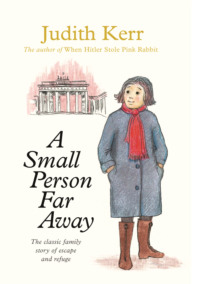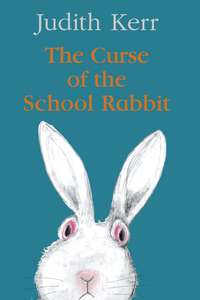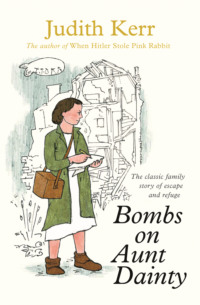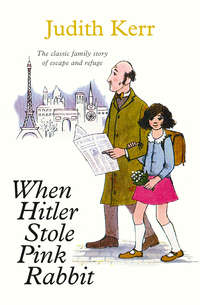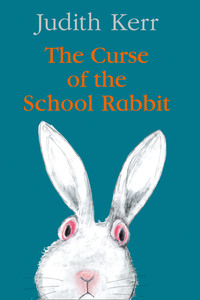
Полная версия
Out of the Hitler Time trilogy: When Hitler Stole Pink Rabbit, Bombs on Aunt Dainty, A Small Person Far Away
“Heimpi,” said Max, “if you suddenly found you had a lot of room in your suitcase – only if, mind you – do you think you could bring the games compendium?”
“If …if …if …” said Heimpi. “If my grandmother had wheels she’d be a bus and we could all go for a ride in her.” That was what she always said.
Then the doorbell rang to announce the arrival of the taxi and there was no more time. Anna hugged Heimpi. Mama said, “Don’t forget the men are coming for the piano on Monday”, and then she too hugged Heimpi. Max could not find his gloves but had them in his pocket all the time. Bertha wept, and the man who looked after the garden suddenly appeared and wished them all a pleasant journey.
Just as the taxi was about to drive off a small figure rushed up with something in his hand. It was Gunther. He thrust a parcel at Max through the window and said something about his mum which they could not understand because the taxi had started. Max shouted goodbye and Gunther waved. Then the taxi went up the street. Anna could still see the house, and Heimpi and Gunther waving …She could still see a bit of the house …At the top of the street they passed the Kentner children on their way to school. They were talking to each other and did not look up …She could still see a tiny bit of the house through the trees …Then the taxi went round the corner and it all disappeared.
It was strange travelling on the train with Mama and without Heimpi. Anna was a little worried in case she felt sick. She had been train-sick a lot when she was small and even now that she had more or less outgrown it Heimpi always brought a paper bag just in case. Did Mama have a paper bag?
The train was crowded and Anna and Max were glad that they had window seats. They both looked out at the grey landscape tearing past until it began to rain. Then they watched the raindrops arrive with a splash and slowly trickle down the glass pane, but it became boring after a while. What now? Anna looked at Mama out of the corner of her eye. Heimpi usually had a few apples or some sweets about her.
Mama was leaning back in her seat. The corners of her mouth were pulled down and she was staring at the bald head of the man opposite without seeing him at all. On her lap was her big handbag with the picture of a camel on it which she had brought back from some journey with Papa. She was holding it very tight – Anna supposed because the tickets and passports were in it. She was clutching it so hard that one of her fingers was digging right in the camel’s face.
“Mama,” said Anna, “you’re squashing the camel.”
“What?” said Mama. Then she realized what Anna meant and loosened her hold on the bag. The camel’s face reappeared, to Anna’s relief, looking just as foolish and hopeful as usual.
“Are you bored?” asked Mama. “We’ll be travelling right through Germany, which you have never done. I hope the rain stops soon so that you can see it all.”
Then she told them about the orchards in Southern Germany – miles and miles of them. “If only we were making this journey a little later in the year,” she said, “you’d be able to see them all in blossom.”
“Perhaps just a few of them might be out already,” said Anna.
But Mama thought it was too early and the bald man agreed. Then they said how beautiful it was, and Anna wished she could see it.
“If the blossom isn’t out this time,” she said, “can we see it another time?”
Mama did not answer at once. Then she said, “I hope so.”
The rain did not let up and they spent a lot of time playing guessing games at which Mama turned out to be very good. Though they could not see much of the country they could hear the change in people’s voices every time the train stopped. Some were almost incomprehensible and Max hit on the idea of asking unnecessary questions like, “Is this Leipzig?” or “What time is it?” just for the pleasure of hearing the strangely accented replies.
They had lunch in the dining car. It was very grand, with a menu to choose from, and Anna had frankfurters and potato salad which was her favourite dish. She did not feel train-sick at all.
Later in the afternoon she and Max walked through the train from end to end and then stood in the corridor. The rain was heavier than ever and dusk came very early. Even if the orchards had been in blossom they would not have been able to see them. For a while they amused themselves by watching the fleeing darkness through their reflections on the glass. Then Anna’s head began to ache and her nose began to run as though to keep pace with the rain outside. She snuggled back into her seat and wished they would get to Stuttgart.
“Why don’t you look at Gunther’s book?” said Mama.
There had been two presents in Gunther’s parcel. One, from Gunther to Max, was a puzzle – a little transparent box with a picture of an open-mouthed monster drawn on the bottom. You had to get three tiny balls into the monster’s mouth. It was very difficult to do on a train.
The other was a book for both children from Gunther’s mum. It was called They Grew to be Great and she had written in it, “Thank you for all the lovely things – something to read on the journey.” It described the early lives of various people who later became famous, and Anna, who had a personal interest in the subject, leafed through it eagerly at first. But the book was so dully written and its tone was so determinedly uplifting that she gradually became discouraged.
All the famous people had had an awful time. One of them had a drunken father. Another had a stammer. Another had to wash hundreds of dirty bottles. They had all had what was called a difficult childhood. Clearly you had to have one if you wanted to become famous.
Dozing in her corner and mopping her nose with her two soaked handkerchiefs, Anna wished that they would get to Stuttgart and that one day, in the long-distant future, she might become famous. But as the train rumbled through Germany in the darkness she kept thinking “difficult childhood …difficult childhood …difficult childhood …”
Chapter Four
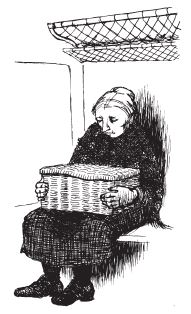
Suddenly she found herself being gently shaken. She must have been asleep. Mama said, “We’ll be in Stuttgart in a few minutes.”
Anna sleepily put on her coat, and soon she and Max were sitting on the luggage at the entrance of Stuttgart station while Mama went to get a taxi. The rain was still pelting down, drumming on the station roof and falling like a shiny curtain between them and the dark square in front of them. It was cold. At last Mama came back.
“What a place!” she cried. “They’ve got some sort of a strike on – something to do with the elections – and there are no taxis. But you see that blue sign over there?” On the opposite side of the square there was a bluish gleam among the wet. “That’s a hotel,” said Mama. “We’ll just take what we need for the night and make a dash for it.”
With the bulk of the luggage safely deposited they struggled across the ill-lit square. The case Anna was carrying kept banging against her leg and the rain was so heavy that she could hardly see. Once she missed her footing and stepped into a deep puddle so that her feet were soaked. But at last they were in the dry. Mama booked rooms for them and then she and Max had something to eat. Anna was too tired. She went straight to bed and to sleep.
In the morning they got up while it was still dark. “We’ll soon see Papa,” said Anna as they ate their breakfast in the dimly-lit dining room. Nobody else was up yet and the sleepy-eyed waiter seemed to grudge them the stale rolls and coffee which he banged down in front of them. Mama waited until he had gone back into the kitchen. Then she said, “Before we get to Zurich and see Papa we have to cross the frontier between Germany and Switzerland.”
“Do we have to get off the train?” asked Max.
“No,” said Mama. “We just stay in our compartment and then a man will come and look at our passports – just like the ticket inspector. But” – and she looked at both children in turn – “this is very important. When the man comes to look at our passports I want neither of you to say anything. Do you understand? Not a word.”
“Why not?” asked Anna.
“Because otherwise the man will say ‘What a horrible talkative little girl, I think I’ll take away her passport’,” said Max, who was always bad-tempered when he had not had enough sleep.
“Mama!” appealed Anna. “He wouldn’t really – take away our passports, I mean?”
“No …no, I don’t suppose so,” said Mama. “But just in case – Papa’s name is so well known – we don’t want to draw attention to ourselves in any way. So when the man comes – not a word. Remember – not a single, solitary word!”
Anna promised to remember.
The rain had stopped at last and it was quite easy walking back across the square to the station. The sky was just beginning to brighten and now Anna could see that there were election posters everywhere. Two or three people were standing outside a place marked Polling Station, waiting for it to open. She wondered if they were going to vote, and for whom.
The train was almost empty and they had a whole compartment to themselves until a lady with a basket got in at the next station. Anna could hear a sort of shuffling inside the basket – there must be something alive in it. She tried to catch Max’s eye to see if he had heard it too, but he was still feeling cross and was frowning out of the window. Anna began to feel bad-tempered too and to remember that her head ached and that her boots were still wet from last night’s rain.
“When do we get to the frontier?” she asked.
“I don’t know,” said Mama. “Not for a while yet.” Anna noticed that her fingers were squashing the camel’s face again.
“In about an hour, d’you think?” asked Anna.
“You never stop asking questions,” said Max, although it was none of his business. “Why can’t you shut up?”
“Why can’t you?” said Anna. She was bitterly hurt and cast around for something wounding to say. At last she came out with, “I wish I had a sister!”
“I wish I didn’t!” said Max.
“Mama …!” wailed Anna.
“Oh, for goodness’ sake, stop it!” cried Mama. “Haven’t we got enough to worry about?” She was clutching the camel bag and peering into it every so often to see if the passports were still there.
Anna wriggled crossly in her seat. Everybody was horrible. The lady with the basket had produced a large chunk of bread with some ham and was eating it. No one said anything for a long time. Then the train began to slow down.
“Excuse me,” said Mama, “but are we coming to the Swiss frontier?”
The lady with the basket munched and shook her head.
“There, you see!” said Anna to Max. “Mama is asking questions too!”
Max did not even bother to answer but rolled his eyes up to heaven. Anna wanted to kick him, but Mama would have noticed.
The train stopped and started again, stopped and started again. Each time Mama asked if it was the frontier, and each time the lady with the basket shook her head. At last when the train slowed down yet again at the sight of a cluster of buildings, the lady with the basket said, “I dare say we’re coming to it now.”
They waited in silence while the train stood in the station. Anna could hear voices and the doors of other compartments opening and shutting. Then footsteps in the corridor. Then the door of their own compartment slid open and the passport inspector came in. He had a uniform rather like a ticket inspector and a large brown moustache.
He looked at the passport of the lady with the basket, nodded, stamped it with a little rubber stamp, and gave it back to her. Then he turned to Mama. Mama handed him the passports and smiled. But the hand with which she was holding her handbag was squeezing the camel into terrible contortions. The man examined the passports. Then he looked at Mama to see if it was the same face as on the passport photograph, then at Max and then at Anna. Then he got out his rubber stamp. Then he remembered something and looked at the passports again. Then at last he stamped them and gave them back to Mama.
“Pleasant journey,” he said as he opened the door of the compartment.
Nothing had happened. Max had frightened her all for nothing.
“There, you see …!” cried Anna, but Mama gave her such a look that she stopped.
The passport inspector closed the door behind him.
“We are still in Germany,” said Mama.
Anna could feel herself blushing scarlet. Mama put the passports back in the bag. There was silence. Anna could hear whatever it was scuffling in the basket, the lady munching another piece of bread and ham, doors opening and shutting further and further along the train. It seemed to last for ever.
Then the train started, rolling a few hundred yards and stopped again. More opening and shutting of doors, this time more quickly. Voices saying, “Customs …anything to declare …?” A different man came into the compartment. Mama and the lady both said they had nothing to declare and he made a mark with chalk on all their luggage, even on the lady’s basket. Another wait, then a whistle and at last they started again. This time the train gathered speed and went on chugging steadily through the countryside.
After a long time Anna asked, “Are we in Switzerland yet?”
“I think so. I’m not sure,” said Mama.
The lady with the basket stopped chewing. “Oh yes,” she said comfortably, “this is Switzerland. We’re in Switzerland now – this is my country.”
It was marvellous.
“Switzerland!” said Anna. “We’re really in Switzerland!”
“About time too!” said Max and grinned.
Mama put the camel bag down on the seat beside her and smiled and smiled.
“Well!” she said. “Well! We’ll soon be with Papa.”
Anna suddenly felt quite silly and light-headed. She wanted to do or say something extraordinary and exciting but could think of nothing at all – so she turned to the Swiss lady and said, “Excuse me, but what have you got in that basket?”
“That’s my mogger,” said the lady in her soft country voice.
For some reason this was terribly funny. Anna, biting back her laughter, glanced at Max and found that he too was almost in convulsions.
“What’s a …what’s a mogger?” she asked as the lady folded back the lid of the basket, and before anyone could answer there was a screech of “Meeee”, and the head of a scruffy black tomcat appeared out of the opening.
At this Anna and Max could contain themselves no longer. They fell about with laughter.
“He answered you!” gasped Max. “You said, ‘What’s a mogger’ and he said …”
“Meeee!” screamed Anna.
“Children, children!” said Mama, but it was no good – they could not stop laughing. They laughed at everything they saw, all the way to Zurich. Mama apologized to the lady but she said she did not mind – she knew high spirits when she saw them. Any time they looked like flagging Max only had to say, “What’s a mogger?” and Anna cried, “Meeee!” and they were off all over again. They were still laughing on the platform in Zurich when they were looking for Papa.
Anna saw him first. He was standing by a bookstall. His face was white and his eyes were searching the crowds milling around the train.
“Papa!” she shouted. “Papa!”
He turned and saw them. And then Papa, who was always so dignified, who never did anything in a hurry, suddenly ran towards them. He put his arms round Mama and hugged her. Then he hugged Anna and Max. He hugged and hugged them all and would not let them go.
“I couldn’t see you,” said Papa. “I was afraid …”
“I know,” said Mama.
Chapter Five
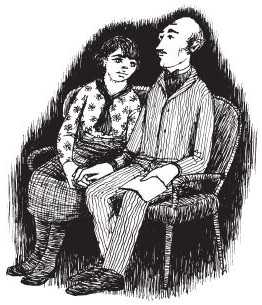
Papa had reserved rooms for them in the best hotel in Zurich. It had a revolving door and thick carpets and lots of gold everywhere. As it was still only ten o’clock in the morning they ate another breakfast while they talked about everything that had happened since Papa had left Berlin.
At first there seemed endless things to tell him, but after a while they found it was nice just being together without saying anything at all. While Anna and Max ate their way through two different kinds of croissants and four different kinds of jam, Mama and Papa sat smiling at each other. Every so often they would remember something and Papa would say, “Did you manage to bring the books?” or Mama would say, “The paper rang and they’d like an article from you this week if possible.” But then they would relapse back into their contented, smiling silence.
At last Max drank the last of his hot chocolate, wiped the last crumbs of croissant off his lips and said, “What shall we do now?”
Somehow nobody had thought.
After a moment Papa said, “Let’s go and look at Zurich.”
They decided first of all to go to the top of a hill overlooking the city. The hill was so steep that you had to go by funicular – a kind of lift on wheels that went straight up at an alarming angle. Anna had never been in one before and spent her time between excitement at the experience and anxious scrutiny of the cable for signs of fraying. From the top of the hill you could see Zurich clustered below at one end of an enormous blue lake. It was so big that the town seemed quite small by comparison, and its far end was hidden by mountains. Steamers, which looked like toys from this height, were making their way round the edge of the lake, stopping at each of the villages scattered along the shores and then moving on to the next. The sun was shining and made it all look very inviting.
“Can anyone go on those steamers?” asked Max. It was just what Anna had been going to ask.
“Would you like to go?” said Papa. “So you shall – this afternoon.”
Lunch was splendid, at a restaurant with a glassed-in terrace overlooking the lake below, but Anna could not eat much. Her head was feeling swimmy, probably from getting up so early, she thought, and though her nose had stopped running her throat was sore.
“Are you all right?” asked Mama anxiously.
“Oh yes!” said Anna, thinking of the steamer trip in the afternoon. Anyway, she was sure it was just tiredness.
There was a shop selling picture postcards next door to the restaurant and she bought one and sent it to Heimpi while Max sent one to Gunther.
“I wonder how they’re getting on with the elections,” said Mama. “Do you think the Germans will really vote for Hitler?”
“I’m afraid so,” said Papa.
“They might not,” said Max. “A lot of the boys at my school were against him. We might find tomorrow that almost no one had voted for Hitler and then we could all go home again, just as Onkel Julius said.”
“It’s possible,” said Papa, but Anna could see that he didn’t really think so.
The steamer trip in the afternoon was a great success. Anna and Max stayed on the open deck in spite of the cold wind and watched the other traffic on the lake. Apart from the steamers there were private motor launches and even a few rowing boats. Their steamer went chug-chugging along from village to village on one side of the lake. These all looked very pretty, with their neat houses nestling among the woods and the hills. Whenever the steamer was getting near a landing stage it hooted loudly to let everyone in the village know that it was coming, and quite a lot of people got on and off each time. After about an hour it suddenly steamed straight across the lake to a village on the other side and then made its way back to Zurich where it had started.
As she walked back to the hotel through the noise of cars and buses and clanging trams Anna found she was very tired, and her head felt swimmy again. She was glad to get back to the hotel room which she shared with Max. She still was not hungry and Mama thought she looked so weary that she tucked her into bed straightaway. As soon as Anna put her head down on the pillow her whole bed seemed to take off and float away in the darkness with a chug-chugging noise which might have been a boat, or a train, or a sound coming from her own head.
Anna’s first impression when she opened her eyes in the morning was that the room was far too bright. She closed them again quickly and lay quite still, trying to collect herself. There was a murmur of voices at the other end of the room and also a rustling sound which she could not identify. It must be quite late and everyone else must be up.
She opened her eyes again cautiously and this time the brightness heaved and swayed and finally rearranged itself into the room she knew, with Max, still in his pyjamas, sitting up in the other bed and Mama and Papa standing close by. Papa had a newspaper and this was what was making the rustling sound. They were talking quietly because they thought she was still asleep. Then the room gave another heave and she closed her eyes again and seemed to drift away somewhere while the voices went on.
Someone was saying, “ …so they’ve got a majority …” Then the voice faded away and another – (or was it the same one?) – said, “ …enough votes to do what he wants …” and then unmistakably Max, very unhappily, “ …so we shan’t be going back to Germany …” Had he really said it three times? Anna opened her eyes with a great effort and said “Mama!” At once one of the figures detached itself from the group and came towards her and suddenly Mama’s face appeared quite close to hers. Anna said “Mama!” again and then all at once she was crying because her throat was so sore.
After this everything became vague. Mama and Papa were standing by her bed looking at a thermometer. Papa had his coat on. He must have gone out to buy the thermometer specially. Someone said, “A hundred and four”, but it couldn’t be her temperature they were talking about because she couldn’t remember having it taken.
Next time she opened her eyes there was a man with a little beard looking at her. He said, “Well, young lady,” and smiled and as he smiled his feet left the ground and he flew to the top of the wardrobe where he changed into a bird and sat croaking, “Influenza” until Mama shooed him out of the window.
Then suddenly it was night and she asked Max to get her some water, but Max was not there, it was Mama in the other bed. Anna said, “Why are you sleeping in Max’s bed?” Mama said, “Because you’re ill,” and Anna felt very glad because if she was ill it meant that Heimpi would be coming to look after her. She said, “Tell Heimpi …” but then she was too tired to remember the rest, and the next time she looked the man with the little beard was there again and she didn’t like him because he was upsetting Mama by saying, “Complications” over and over again. He had done something to the back of Anna’s neck and had made it all swollen and sore, and now he was feeling it with his hand. She said, “Don’t do that!” quite sharply, but he took no notice and tried to make her drink something horrible. Anna was going to push it away, but then she saw that it was not the man with the beard after all but Mama, and her blue eyes looked so fierce and determined that it didn’t seem worth resisting.
After this the world grew a little steadier. She began to understand that she had been ill for some time, that she still had a high temperature and that the reason she felt so awful was that all the glands in her neck were enormously swollen and tender.
“We must get the temperature down,” said the doctor with the beard.
Then Mama said, “I’m going to put something on your neck to make it better.”
Anna saw some steam rising from a basin.
“It’s too hot!” she cried. “I don’t want it!”
“I won’t put it on too hot,” said Mama.
“I don’t want it!” screamed Anna. “You don’t know how to look after me! Where’s Heimpi? Heimpi wouldn’t put hot steam on my neck!”
“Nonsense!” said Mama, and suddenly she was holding a steaming pad of cotton wool against her own neck. “There,” she said, “if it’s not too hot for me it won’t be too hot for you” – and she clapped it firmly on Anna’s neck and quickly wrapped a bandage round it.




